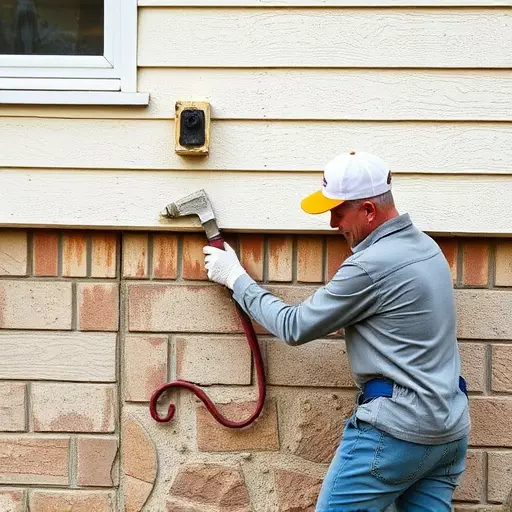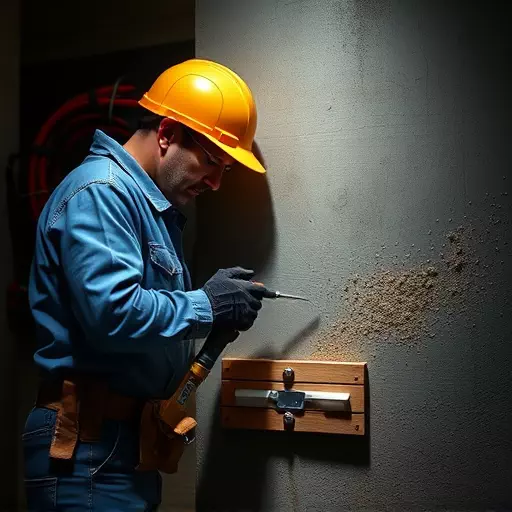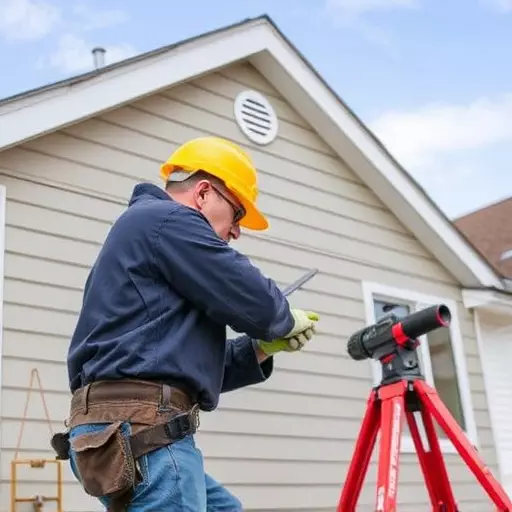Homeowners can effectively manage common appliance issues through basic home repair and maintenance skills, including checking for simple fixes like faulty thermostats or blocked drains. Regular maintenance, such as cleaning and sealing, ensures efficient operation and extends appliance lifespans. Professional installation techniques save energy, reduce accidents, and optimize performance. A well-equipped toolkit enables homeowners to tackle everyday repairs, while a systematic troubleshooting approach saves time and money. For complex issues, certified technicians provide specialized knowledge and tools, ensuring safety and effective resolution. Regular checks, vigilance for unusual behavior, and proactive maintenance extend appliance lifespans and prevent costly repairs.
In the realm of home repair and maintenance, appliance installation and repair are essential components of any DIY enthusiast’s toolkit. From fridges to washing machines, understanding common issues and proper installation techniques can extend appliance lifespan significantly. This comprehensive guide delves into the intricacies of appliance troubleshooting, covers necessary tools for efficient repairs, and highlights when professional help is paramount. By following these tips, folks can navigate the labyrinthine path of home appliance maintenance with confidence.
- Understanding Common Appliance Issues and Their Solutions
- The Importance of Proper Appliance Installation Techniques
- Tools and Equipment Essential for Efficient Repair Work
- Step-by-Step Guide to Major Appliance Troubleshooting
- When to Seek Professional Help for Appliance Repairs
- Regular Maintenance Tips to Extend Appliance Lifespan
Understanding Common Appliance Issues and Their Solutions

Many common appliance issues can be easily resolved by homeowners with a basic understanding of home repair and maintenance. One of the most frequent problems is a refrigerator that’s not cooling properly. This could be due to a faulty thermostat, a blocked condensate drain, or loose connections. Addressing these issues promptly prevents food spoilage and ensures your fridge operates efficiently.
Oven malfunctions are also prevalent, often stemming from temperature control problems or a faulty heating element. Simple troubleshooting steps like checking the oven’s power supply and ensuring proper gas or electric connections can resolve most cases. Regular maintenance, such as cleaning the oven and replacing old door seals, further extends their lifespan and improves performance.
The Importance of Proper Appliance Installation Techniques

Proper appliance installation techniques are paramount in home repair and maintenance for several reasons. When appliances are correctly installed, they function optimally, ensuring energy efficiency and extending their lifespan. Moreover, it minimizes the risk of accidents or injuries caused by improper use due to instability or incorrect setup.
Unskilled or hasty installations can lead to costly replacements down the line. Professional installation services ensure that all components are secured properly, connections are reliable, and settings are optimized for performance and safety. This proactive approach contributes to a well-maintained home environment, saving time, money, and potential headaches in the long run.
Tools and Equipment Essential for Efficient Repair Work

When it comes to appliance installation and repair, having the right tools is half the battle won. For efficient home repair and maintenance, a well-stocked toolkit is essential. Basic tools such as screwdrivers (both flathead and Phillips), pliers, wire strippers, and a multi-tool are must-haves. These allow for precise disassembly and reassembly of appliances, ensuring secure connections and proper functionality.
Advanced tools like voltage testers, adjustable wrenches, and soldering irons can be invaluable for more complex repairs. A high-quality ladder and safety gear are also crucial, especially when working on higher areas or dealing with heavy equipment. Proper tools not only make the repair process smoother but also contribute to longer-lasting appliance performance, thereby enhancing your home’s overall maintenance.
Step-by-Step Guide to Major Appliance Troubleshooting

When it comes to major appliance troubleshooting, a systematic approach can save time, money, and frustration. Start by identifying the issue—is the appliance not turning on, making unusual noises, or performing inconsistently? Check for power supply problems first; ensure the appliance is plugged in securely and the outlet is functional. If power is confirmed, examine basic controls and settings to rule out user error. Refer to the user manual for troubleshooting tips specific to your model.
Next, inspect common issues like loose connections, faulty wires, or damaged components. Simple fixes such as tightening a loose wire connection or replacing a burnt-out fuse can resolve many problems. If the issue persists, consider more complex problems like motor failure or sensor malfunctions, which may require professional intervention. Effective troubleshooting involves methodical elimination of potential causes until the root problem is identified and rectified, ensuring efficient home repair and maintenance.
When to Seek Professional Help for Appliance Repairs

Many minor appliance issues can be easily fixed with some DIY troubleshooting. However, there comes a time when a simple fix isn’t enough. Knowing when to seek professional help for appliance repairs is crucial for effective home repair and maintenance. If your appliance won’t turn on or has stopped working altogether, it might be best to call in a pro. Complex electrical components and intricate machinery often require specialized tools and knowledge that a general homeowner doesn’t possess.
Additionally, if you’ve already attempted a few troubleshooting steps without success, it could indicate a more serious problem. Certain appliances, such as ovens or dishwashers, have numerous safety features and complex mechanisms. Unqualified attempts at repair could void warranties and potentially cause further damage. In these cases, contacting a certified appliance repair technician is the sensible choice to ensure your home’s safety and effective resolution of the issue.
Regular Maintenance Tips to Extend Appliance Lifespan

Regular maintenance is key to extending the lifespan of your appliances, saving you time and money in the long run. Start by scheduling routine checks; this can prevent small issues from turning into major problems. For example, checking the filters on your refrigerator or washing machine regularly ensures optimal performance and energy efficiency.
Keep an eye out for any unusual noises or changes in operation, as these could be early warning signs of potential failures. Simple tasks like cleaning appliance components, replacing worn-out parts, and ensuring proper ventilation can go a long way in maintaining their functionality. Remember, proactive home repair and maintenance are essential to keeping your appliances running smoothly and avoiding costly repairs.
In the realm of home repair and maintenance, appliance installation and repair are essential skills. By understanding common issues, employing proper installation techniques, and maintaining regular upkeep, homeowners can extend the lifespan of their appliances, saving time and money. Armed with the right tools, knowledge from troubleshooting guides, and awareness of when to seek professional help, folks can navigate the symphony of home appliance care like a true expert.
